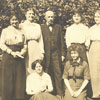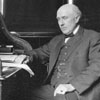Information School History
The Information School's roots extend back to the very first decade of the 20th century. Founded by Harriet Howe, Josephine Meissner, William E. Henry and Charles W. Smith, the library school was established as a response to the growing need, in the Western United States, for highly trained, well-prepared librarians. Prior to 1911, untrained librarians in the Pacific Northwest were trained through a six-week summer course offered at the UW. Howe and her other faculty colleagues established the Department of Library Economy in the College of Liberal Arts at the UW in 1911.
Over the course of the next 90 years, the school continued to play an essential role in the field of librarianship in the Northwest, as the school gained a reputation for producing extremely strong library professionals. The first dean, William E. Henry, espoused a teaching philosophy that emphasized exposing students to experienced and open-minded instructors who embraced the challenges of the changing conditions in library service. While the school changed names several times in the next 90 years, this spirit continued to inform teaching in the field of librarianship at the UW.
Beginning in 2000, under the leadership of Professor and Dean Emeritus Michael Eisenberg and in response to changes in the ways people create, store, find, manipulate and share information, the school introduced a variety of new continuing education certificate programs and new degree programs, including the Online Master of Library and Information Science, the Bachelor of Science in Informatics, the Ph.D. in Information Science and the Master of Science in Information Management.
In 2001, the Information School became the newest independent school of the UW. Also in 2001, the Information School moved into its new state-of-the-art quarters in Mary Gates Hall. Throughout its history, the Information School has remained committed to preparing its students to thrive in the rapidly-evolving information field, with a growing emphasis on cutting-edge research that reflects the school's passion, vision and mission.
Information School Timeline
Some key milestones in Information School history:
1911: Full-time program first established
 Prior to the full-time program, a six-week summer course of library training was conducted to help prepare the untrained librarians of the Seattle area and the Pacific Northwest. Harriet Howe of the University of Illinois Library School first taught this summer course in 1905 and 1906. In 1907 Josephine Meissner joined the UW Library as head of circulation and was invited to teach the summer course along with William E. Henry, head librarian, and Charles W. Smith, assistant librarian. These four faculty members were responsible for the establishment of the full-time program in 1911, known as the Department of Library Economy in the College of Liberal Arts. The first class of 10 students (pictured) graduated in 1913.
Prior to the full-time program, a six-week summer course of library training was conducted to help prepare the untrained librarians of the Seattle area and the Pacific Northwest. Harriet Howe of the University of Illinois Library School first taught this summer course in 1905 and 1906. In 1907 Josephine Meissner joined the UW Library as head of circulation and was invited to teach the summer course along with William E. Henry, head librarian, and Charles W. Smith, assistant librarian. These four faculty members were responsible for the establishment of the full-time program in 1911, known as the Department of Library Economy in the College of Liberal Arts. The first class of 10 students (pictured) graduated in 1913.
1922: Founding of the University of Washington Library School
 From an article written in 1922 by the Library School's first Director, William E. Henry: "We found, as all have found in the Pacific Northwest, an excellent supply of keen, intelligent, wide-awake, academically well-educated young people, ready in spirit for any kind of service, for the people who have migrated to the westward for a thousand years have been the keen, energetic, venturesome, and progressive. ... Our libraries, then just getting under way, could not offer financial inducements or professional opportunities that compared favorably with the many libraries east of the Mississippi, especially when we must add to these differences the fact that coming to the West Coast involved an expensive journey of from 2,000 to 3,000 miles. However, with all of these handicaps we did secure a few who were willing to make the sacrifice necessary and, as was to be expected, then a high-class, well-prepared group of persons, and these, more than any other single influence, made our libraries successful."
From an article written in 1922 by the Library School's first Director, William E. Henry: "We found, as all have found in the Pacific Northwest, an excellent supply of keen, intelligent, wide-awake, academically well-educated young people, ready in spirit for any kind of service, for the people who have migrated to the westward for a thousand years have been the keen, energetic, venturesome, and progressive. ... Our libraries, then just getting under way, could not offer financial inducements or professional opportunities that compared favorably with the many libraries east of the Mississippi, especially when we must add to these differences the fact that coming to the West Coast involved an expensive journey of from 2,000 to 3,000 miles. However, with all of these handicaps we did secure a few who were willing to make the sacrifice necessary and, as was to be expected, then a high-class, well-prepared group of persons, and these, more than any other single influence, made our libraries successful."
1926: UW Included in First-Ever Round of ALA Accreditations
In 1926, the Department of Library Economy was accredited as a library school by the American Library Association. This was the first year of accreditations by the ALA, when it reviewed and accepted 13 programs including the University of Washington. Seven of those programs are still actively educating librarians. The Information School's current Master of Library and Information Science program is now the oldest accredited program west of the Mississippi.
1932: Move to the Graduate School
The Library School becomes the Department of Library Science in the Graduate School.
1935: School of Librarianship
The name changed to School of Librarianship in the College of Arts & Sciences, but it remained a part of the Graduate School.
1951: Master's program launched
In the summer of 1951, after many years of scrutiny, the UW School of Librarianship instituted its new one-year (four-quarter) master's degree program. (Lieberman, 1981, p. 444) The first graduates of the new master's program were awarded the Master of Librarianship in June of 1952.
1971: First computer-related class
 From Irving Lieberman's Director's Update, in the Fall 1971 Alumni Newsletter. The 1971 Summer Quarter, in addition to the regular program offered, included several special courses. Particularly notable were the seminar courses, under the rubric "Special Topics in Librarianship: Aspects of Publishing, Special Librarianship, Information System Design, Archives Seminar, International and Comparative Librarianship and Municipal and County Libraries and Library Systems." The course, Librarianship 497, provided an introduction to the role of computers in libraries. It emphasized what computers can and cannot do, prerequisites for their effective use and areas of current application.
From Irving Lieberman's Director's Update, in the Fall 1971 Alumni Newsletter. The 1971 Summer Quarter, in addition to the regular program offered, included several special courses. Particularly notable were the seminar courses, under the rubric "Special Topics in Librarianship: Aspects of Publishing, Special Librarianship, Information System Design, Archives Seminar, International and Comparative Librarianship and Municipal and County Libraries and Library Systems." The course, Librarianship 497, provided an introduction to the role of computers in libraries. It emphasized what computers can and cannot do, prerequisites for their effective use and areas of current application.
1979: 2-year master's program instituted
After considerable discussion and effort, a new curriculum for a two-year master's degree program was completed and instituted in the fall of 1979. In 1979, UW and UCLA were the only schools in the nation to offer a two-year Master of Librarianship program.
1983: Another name change
The School of Librarianship becomes The Graduate School of Library and Information Science.
2000: Ph.D. in Information Science first offered
In the words of the Graduate School Council report, the Ph.D. in Information Science would "give the University of Washington a new offering of significance", "meet a critically important educational need" and "enhance related programs across campus." The School welcomed its first seven Ph.D. students in Fall Quarter, 2000.
2000: Informatics major created
Beginning Autumn quarter of 2000, the UW began offering a new Informatics major that emphasized the human side of technology, as well as a more humanities-oriented approach to information technology.
2001: The Information School becomes an independent school at the UW
In 2001, the Information School became an independent school of the UW. Also in 2001, the School moved into its new state-of-the-art quarters in Mary Gates Hall. After three years at the UW, Dean Mike Eisenberg celebrated the success of the Information School as it was named the 16th independent school of the UW: "Our transformation is complete!"
2001: Master of Science in Information Management added
The Information School announced a new degree program beginning Autumn 2001, the Master of Science in Information Management (MSIM). It began as a mid-career program focusing on users and the use of information. Prospective students were management professionals who desire more exposure to information technology, information technology professionals aspiring to information management responsibilities, and mid-career library and information science professionals who want to further their education and advance professionally.
2005: Formation of Beverly Cleary Endowed Professorship
 The Information School created an endowed professorship for children's librarianship. Believed to be the first such endowment anywhere, the Beverly Cleary Endowed Professorship in Children and Youth Services focuses on training librarians throughout the region. The professorship honors Beverly Cleary, writer of more than 30 award-winning children's books and an Information School alum. We have her to thank for such famous characters as Ramona Quimby and Henry Huggins.
The Information School created an endowed professorship for children's librarianship. Believed to be the first such endowment anywhere, the Beverly Cleary Endowed Professorship in Children and Youth Services focuses on training librarians throughout the region. The professorship honors Beverly Cleary, writer of more than 30 award-winning children's books and an Information School alum. We have her to thank for such famous characters as Ramona Quimby and Henry Huggins.
2007: First research center joins the Information School
The research center now known as the Technology and Social Change Group (TASCHA) became part of the Information School after operating independently from 1999-2007. TASCHA built its reputation in the area of information and communication technologies and development. Its research and programs bring together faculty and students from across campus.
2017: Informatics minor added
To better meet the demand for the Informatics program, the Information School launched a non-competitive Informatics minor in Fall 2017. The minor is directed to students who want to know more about how to apply data, information and technology to solve problems in their chosen field.
2018: Anind Dey becomes the third dean of the Information School
Dr. Dey came to the UW from Carnegie Mellon University, where he was the director and Charles M. Geschke Chair for the Human-Computer Interaction Institute. He earned his Ph.D. in computer science, specializing in context-aware and ubiquitous computing, and a master’s of science in aerospace engineering, both from Georgia Tech. His earned his undergraduate degree in computer engineering at Simon Fraser University in British Columbia. Dr. Dey was appointed following the retirement of Dean Harry Bruce on Sept. 1, 2017.
2020: Master of Science in Information Management adds online mode
The Information School expands access to the Master of Science in Information Management by offering students the opportunity to complete the program fully online.
2020: First AI-focused class
The doctorate-level research seminar course supported then Ph.D. Candidate Stefania Druga’s work to create a novel AI literacy framework for families. Organized as a directed research group, the course invited students to learn how to develop novel AI learning tools and public-facing resources for AI literacy.
2020: Associate Dean for IDEAS position added
Dean Dey establishes an associate dean position to oversee and strengthen the Information School’s work related to diversity, equity and inclusion. Professor Wanda Pratt is appointed to the role, which is later renamed Associate Dean for IDEAS (Inclusion, Diversity, Equity, Access and Sovereignty).
2023: Museology program joins the Information School
The UW’s long-standing Museology program joined the Information School after operating as an interdisciplinary program housed in the Graduate School since 1970.
